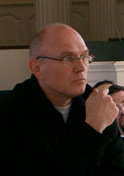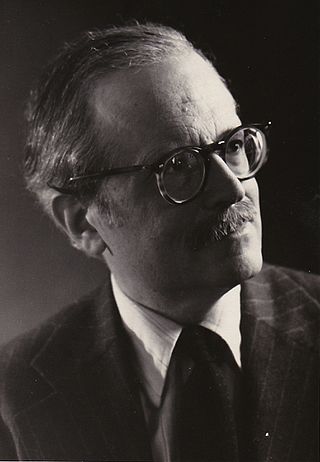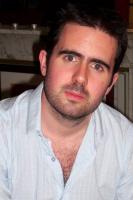Related Research Articles

Reformed Christianity, also called Calvinism, is a major branch of Protestantism that began during the sixteenth-century Protestant Reformation, a schism in the Western Church. In the modern day, it is largely represented by the Continental, Presbyterian, and Congregational traditions, as well as parts of the Anglican and Baptist traditions.
Natural theology, once also termed physico-theology, is a type of theology that seeks to provide arguments for theological topics based on reason and the discoveries of science, the project of arguing for the existence of God on the basis of observed natural facts, and through natural phenomena viewed as divine, or complexities of nature seen as evidence of a divine plan or Will of God, which includes nature itself.
Universalism is the philosophical and theological concept that some ideas have universal application or applicability.
Sola scriptura is a Christian theological doctrine held by most Protestant Christian denominations, in particular the Lutheran and Reformed traditions, that posits the Bible as the sole infallible source of authority for Christian faith and practice. The Catholic Church considers it heterodox and generally the Orthodox churches consider it to be contrary to the phronema of the Church.
Biblical inerrancy is the belief that the Bible "is without error or fault in all its teaching"; or, at least, that "Scripture in the original manuscripts does not affirm anything that is contrary to fact". Some equate inerrancy with biblical infallibility; others do not.

Interfaith dialogue refers to cooperative, constructive, and positive interaction between people of different religious traditions and/or spiritual or humanistic beliefs, at both the individual and institutional levels.

Miroslav Volf is a Croatian Protestant theologian and public intellectual and Henry B. Wright Professor of Theology and director of the Yale Center for Faith and Culture at Yale University. He previously taught at the Evangelical Theological Seminary in his native Osijek, Croatia and Fuller Theological Seminary in Pasadena, California (1990–1998).

Thomas Clark Oden (1931–2016) was an American Methodist theologian and religious author. He is often regarded as the father of the paleo-orthodox theological movement and is considered to be one of the most influential theologians of the 20th century and the beginning of the 21st century. He was Henry Anson Buttz Professor of Theology and Ethics at Drew University in New Jersey from 1980 until his retirement in 2004.
Postliberal theology is a Christian theological movement that focuses on a narrative presentation of the Christian faith as regulative for the development of a coherent systematic theology. Thus, Christianity is an overarching story, with its own embedded culture, grammar, and practices, which can be understood only with reference to Christianity's own internal logic.

Timothy John Winter, also known as Abdal Hakim Murad, is an English academic, theologian and Islamic scholar who is a proponent of Islamic neo-traditionalism. His work includes publications on Islamic theology, modernity, and Anglo-Muslim relations, and he has translated several Islamic texts.
Graeme L. Goldsworthy is an Australian evangelical Anglican theologian specialising in the Old Testament and Biblical theology. His most significant work is a trilogy: Gospel and Kingdom, Gospel and Wisdom, and The Gospel in Revelation. Goldsworthy has authored several other books including According to Plan: The Unfolding Revelation of God in the Bible, and Preaching the Whole Bible as Christian Scripture. He holds a Master of Arts degree from the University of Cambridge in England, and Master of Theology and Doctor of Philosophy degrees from Union Theological Seminary, Richmond, Virginia.
Bernard L. Ramm was a Baptist theologian and apologist within the broad evangelical tradition. He wrote prolifically on topics concerned with biblical hermeneutics, religion and science, Christology, and apologetics. The hermeneutical principles presented in his 1956 book Protestant Biblical Interpretation influenced a wide spectrum of Baptist theologians. During the 1970s he was widely regarded as a leading evangelical theologian as well known as Carl F.H. Henry. His equally celebrated and criticized 1954 book The Christian View of Science and Scripture was the theme of a 1979 issue of the Journal of the American Scientific Affiliation, while a 1990 issue of Baylor University's Perspectives in Religious Studies was devoted to Ramm's views on theology.
Scriptural Reasoning ("SR") is one type of interdisciplinary, interfaith scriptural reading. It is an evolving practice of diverse methodologies in which Christians, Jews, Muslims, Hindus, Buddhists, Sikhs, Baháʼís, and members of other faiths, meet in groups to study their sacred scriptures and oral traditions together, and to explore the ways in which such study can help them understand and respond to particular contemporary issues. Originally developed by theologians and religious philosophers as a means of fostering post-critical and postliberal corrections to patterns of modern reasoning, it has now spread beyond academic circles.
Daniel Wayne Hardy was an ordained Anglican priest or presbyter. He taught theology at universities in the US and England.
John Bainbridge Webster (1955–2016) was an Anglican priest and theologian writing in the area of systematic, historical, and moral theology. Born in Mansfield, England, on 20 June 1955, he was educated at the independent Bradford Grammar School and at the University of Cambridge. After a distinguished career, he died at his home in Scotland on 25 May 2016 at the age of 60. At the time of his death, he was the Chair of Divinity at St. Mary's College, University of St Andrews, Scotland.

Michael Wyschogrod was a Jewish German-American philosopher of religion, Jewish theologian, and activist for Jewish–Christian interfaith dialogue. During his academic career he taught in philosophy and religion departments of several universities in the United States, Europe and Israel.
Peter W. Ochs is the Edgar M. Bronfman Professor of Modern Judaic Studies at the University of Virginia, where he has served since 1997. He is an influential thinker whose interests include Jewish philosophy and theology, modern and postmodern philosophical theology, pragmatism, and semiotics. Ochs coined the term "scriptural reasoning" and is the co-founder of the Society for Scriptural Reasoning, which promotes interfaith dialog among Christians, Jews, and Muslims through scriptural study groups. He is also a co-founder of the Children of Abraham Institute, which promotes interfaith study and dialog among members of the Abrahamic religions.
Paul David Loup Avis is an English Anglican priest, theologian, and ecumenist. He was General Secretary of the Church of England's Council for Christian Unity from 1998 to 2011, theological consultant to the Anglican Communion Office, London, from 2011 to 2012, and Canon Theologian of Exeter Cathedral from 2008 to 2013. He was honorary professor in the Department of Theology and Religion at Durham University 2017–2021 and is currently Honorary Professor in the School of Divinity, University of Edinburgh (2022-). At the University of Exeter he was visiting professor of theology from 2009 to 2017 and subsequently honorary research fellow until 2021. He is the editor of the series Anglican-Episcopal Theology and History, also published by Brill. Avis was also a chaplain to Queen Elizabeth II, 2008–2017.

Atharism or Atharī theology, otherwise referred to as Traditionalist theology or Scripturalist theology, is one of the main Sunni schools of Islamic theology which is more strict in adherence to the Quran and Sunnah. it emerged as a school of theology in the late 8th century CE from the scholarly circles of Ahl al-Hadith, an early Islamic religious movement that rejected the formulation of Islamic doctrine derived from rationalistic Islamic theology (kalām) in favor of strict textualism in interpreting the Quran and the ḥadīth. The name derives from "tradition" in its technical sense as a translation of the Arabic word athar. Its adherents are referred to by several names such as "Ahl al-Athar", "Ahl al-Hadith", etc.

Tom Greggs FRSE is a British theologian and the Marischal Professor of Divinity at the University of Aberdeen.
References
- 1 2 3 4 5 6 7 Cunningham, David S. (3 May 2003). "The Practical Theology of David F. Ford". The Christian Century : 30–37. Archived from the original on 2 November 2011. Retrieved 23 May 2011.
- 1 2 3 4 5 6 7 8 "David Ford Profile". University of Cambridge. 2010. Archived from the original on 2 June 2011. Retrieved 21 May 2011.
- 1 2 3 "Faculty Members: Professor David Ford". University of Cambridge. 2011. Archived from the original on 24 August 2011. Retrieved 21 May 2011.
- ↑ "The Irish School of Ecumenics (1970–2007): 'Like wheat that springs up green' – Foreword". Catholic Ireland. 2010. Archived from the original on 27 September 2011. Retrieved 21 May 2011.
- 1 2 3 4 Ford, David (2 April 2011). "A Journey into Interfaith Engagement". HuffPost . Retrieved 21 May 2011.
- 1 2 Acknowledgements (in Christian Wisdom: Desiring God and Learning in Love) (PDF). Cambridge University Press. 2007. p. xiv. ISBN 978-0-521-87545-5.
- 1 2 3 4 5 "David Ford" (PDF). The John Paul II Center for Interreligious Dialogue. Archived from the original (PDF) on 25 July 2011. Retrieved 21 May 2011.
- ↑ Ford, David (5 April 2000). "Theological Wisdom, British Style". The Christian Century: 388–391. Archived from the original on 2 November 2011. Retrieved 23 May 2011.
- 1 2 "The Annual Bishop's Clergy / Lay Employee / Spouse Conference: May 4–6, 2009". Diocese of Virginia. Archived from the original on 24 March 2012. Retrieved 21 May 2011.
- ↑ "History". Woolf Institute. Archived from the original on 6 January 2011. Retrieved 21 May 2011.
- 1 2 Bailey, Dr. Jeffrey R. "New Models for Religion in Public: Inter-Faith Friendship and the Politics of Scriptural Reasoning". The Christian Century. Archived from the original on 16 March 2012. Retrieved 21 May 2011.
- ↑ "Participating Societies". Society for Scriptural Reasoning. 2006. Retrieved 21 May 2011.
- 1 2 "Contributors: David F. Ford". Greenbelt. Retrieved 21 May 2011.
- ↑ "Archbishop's Christian-Muslim initiative continues in Sarajevo – further details". Archbishop of Canterbury. 12 May 2005. Retrieved 21 May 2011.
- ↑ "List of Invitees of World Conference for Dialogue, Madrid" (PDF). Muslim World League. Retrieved 21 May 2011.
- ↑ "Christian leaders ask for Muslim forgiveness". Khaleej Times . 26 November 2007. Archived from the original on 8 June 2011. Retrieved 21 May 2011.
- ↑ "Letter to President Obama about Libya". Center for the Study of Islam and Democracy. Archived from the original on 21 July 2011. Retrieved 21 May 2011.
- ↑ "The Revd. Debbie Ford". Addenbrookes Hospital. 3 August 2007. Archived from the original on 2 October 2011. Retrieved 21 May 2011.
- ↑ "St Andrew's Church, Cherry Hinton - Our Team". Archived from the original on 27 February 2022. Retrieved 27 February 2022.
- ↑ "Oman gift endows CIP Academic Directorship". Cambridge Inter-Faith Programme. 2011. Archived from the original on 11 September 2011. Retrieved 21 May 2011.
- ↑ "Quote". The Cambridge Inter-Faith Program. 2011. Archived from the original on 16 March 2012. Retrieved 21 May 2011.